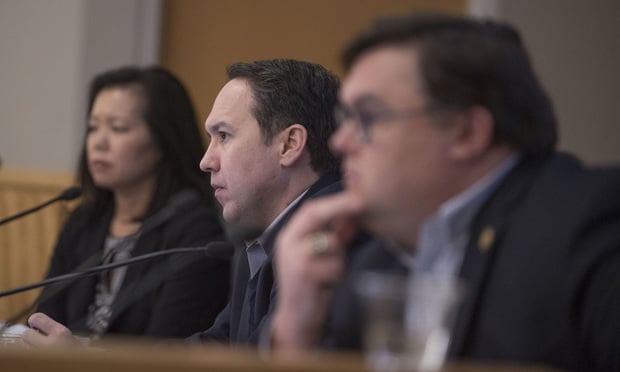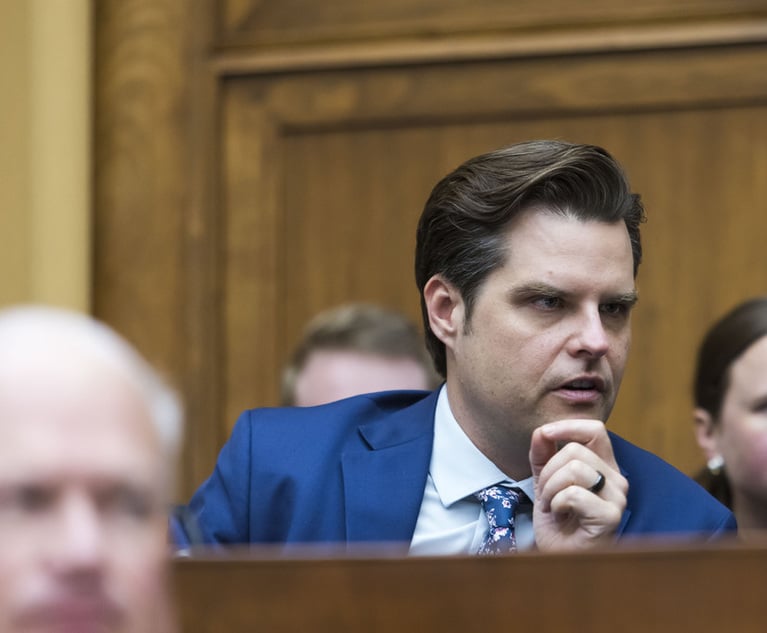Big Data Meets the Constitution in New Originalism Project
Georgia appellate judges evaluate cutting-edge inquiries into what the Constitution's framers meant from Georgia State University law students.
May 01, 2018 at 03:51 PM
9 minute read
The original version of this story was published on Daily Report

Five Georgia appellate judges visited a Georgia State University College of Law seminar recently to evaluate an innovative new big-data tool for ascertaining the original meaning of oft-contested words in the U.S. Constitution and other historic legal texts.
Law students in the seminar on judicial power came up with results that might surprise some Constitutional originalists: In proscribing ”cruel” punishment in the Eighth Amendment, for instance, the framers' aim may have been to prevent the state's abuse of power as much as physical pain.
The students are the first to try out a searchable new database, the Corpus of Founding Era English (COFEA), made up of more than 95,000 documents from the era that Brigham Young University Law School is developing.
The COFEA documents encompass newspapers, speeches, novels, diaries and personal correspondence that were produced from 1760 to 1799 during the colonial independence movement and subsequent ratification debates over the Constitution and Bill of Rights.
One criticism of originalism, noted the seminar's professor, Clark Cunningham, is that it's impossible to know what people really meant with certain terms back then. “Now it's easier to,” he said.
“This is revolutionary,” said Georgia Appeals Court Chief Judge Stephen Dillard, himself an originalist. “It's like Westlaw for originalism.”
His colleague Judge Carla Wong McMillian and Georgia Supreme Court Justice Keith Blackwell concurred. “It's a new tool with a lot of potential for expanding the scope of research and understanding,” Blackwell said.
The COFEA database is the first in the burgeoning field of “corpus linguistics” to assemble such a wide-ranging body of U.S. texts from the founding era of the United States.
“The excitement about COFEA is that it really has potential to bring objective, empirical perspective to this type of exploration in assessing meaning,” Cunningham said.
Several students presented Dillard, McMillian and Blackwell with their findings on contemporaneous uses of key phrases like “cruel and unusual punishment” and “excessive bail' in the Eighth Amendment.
Georgia Supreme Court Justice Nels Peterson and Appeals Court Judge Sara Doyle heard a separate panel on “executive power” and the First Amendment, respectively.
How It Works
To explain how COFEA works, Cunningham tested the usage of “commerce” during the founding era. There is a long-running debate over how much power the Commerce Clause actually grants Congress to regulate the states' activity, and it hinges on the word's intended meaning.
Did “commerce” refer merely to trade and exchange, or did it extend more broadly to manufacturing and agriculture?
Justice Clarence Thomas decided the former in his concurrence to an important Supreme Court case, U.S. v. Lopez (1995). The court narrowly ruled that the 1990 Gun-Free School Zones Act, which relied on the Commerce Clause for its regulatory and enforcement powers, exceeded the clause's bounds and was unconstitutional.
“Our case law has drifted far from the original understanding of the Commerce Clause,” wrote Thomas, adding that, when the Constitution was ratified, “commerce” referred only to the exchange and transport of goods.
To back that up, Constitutional law professor Randy Barnett at Georgetown University, also well-known for his originalist approach, deployed two research assistants to comb through every issue of The Pennsylvania Gazette from 1728 to 1800 for the term. They found 1,594 instances in the newspaper—the New York Times of its era, Cunningham said—and in each, the context was “trade and exchange” or transportation for that purpose.
Rather than settle the debate, Barnett's 2003 report in the Arkansas Law Review stirred up more controversy. Critics charged that his conclusion was not objective, Cunningham said, since it was up to the two law students to determine the meaning for each usage.
Cunningham found almost 20,000 instances of “commerce” in COFEA's document stockpile. The few times when the word appeared with “manufacturing” in his check for counterexamples, he said, they were clearly mutually exclusive terms, as demonstrated in a passage he displayed via PowerPoint from Alexander Hamilton's 1791 Report of Manufactures.
COFEA is still in beta testing, but when it goes public, Cunningham said, interested parties can use it to perform a far broader and much faster search of contemporaneous word-usage—and anyone will be able to replicate their methodology and assess the results themselves.
The judges liked the idea of linguistic exegesis of historic documents that is publicly available and transparent. In reply to a query from Dillard, Cunningham said COFEA will likely launch for the public next year.
Defining 'Cruel'
A presentation on “cruel and unusual punishment” revealed surprising results. The full Eighth Amendment reads: “Excessive bail shall not be required, nor excessive fines imposed, nor cruel and unusual punishment inflicted.”
Cece Howard and Aaron Smothers wanted to know whether there was any proportionality standard at the time for the “cruel and unusual punishment” clause.
For context clues, they examined the usage of the term “cruel and unusual,” as well as the words “cruel” and “unusual” individually, in all ratification-era documents for the Constitution and the Bill of Rights from 1787 to 1791. To keep things manageable, they used a subset of COFEA, Rotunda's American Founding Era, maintained by the University of Virginia.
“The definition of 'cruel' was not as clear as we expected,” Howard said, adding that they expected the word to be used solely in the context of physical pain or harm. Instead, she said, it often referred to “oppressive, tyrannical government.”
Dillard objected that “cruel and unusual” is a term of art derived from the English Bill of Rights and asked if looking at “cruel” on its own was a shift in context.
Howard explained that they wanted to learn how the debaters and ratifiers of the U.S.Bill of Rights from the various states might have understood the terms, either alone or together, in their new country—and whether the meaning had changed from when the term “cruel and unusual” was first used in the Declaration of Right a century earlier in England, opposing the excesses of King James II.
Their search of documents from the ratification-era time-period produced 97 instances of the word “cruel,” Howard said. It was coupled with “unusual” only 20 times, while joined with a different adjective 30 times—and used by itself for the other half.
When used alone, she said, “cruel” was at times deployed in the expected reference to physical pain, but frequently also as hyperbole—decrying “cruel Parliament or Congress,” for example—or to describe the “government's abuse of power.”
One possible conclusion, Howard said, is that in our current era, “We focus too much on forms of punishment and their excessiveness, instead of whether a government actor enacted the punishment as an abuse of power.”
Radical Originalism
Critics of originalist interpretations of the Constitution argue that they are too restrictive for our modern times, but Cunningham said COFEA could allow for more expansive interpretations of individual rights in foundational legal texts.
“Judges interested in original meanings are willing to overrule precedent,” he said, if the meanings of terms point in a different direction.
The original meanings of terms such as “excessive bail” or “cruel and unusual punishment” do not necessarily mean a more restrictive interpretation of the rights of the individual against the state, he added.
“Remember, these people were revolutionaries,” Cunningham said. “The people who wrote our Constitution wanted to give us the gift of liberty and protect us from tyranny and oppression. That's the reason we have the Bill of Rights.”
“I look at it as trying to recapture the spirit of the Constitution—as a reinvigoration,” he said.
Big Data and Blackstone
The judges praised the students' work, which Dillard called an “evolution of how we understand original meanings of the Constitution.”
With the caveat that the public needs to be able to see the results, they said it “fast-tracks” their research, welcome on two of the nation's busiest appellate courts.
McMillian liked the speed, and Blackwell noted that it allows a “more comprehensive survey” of language in the context of the era.
Dillard said he currently uses legal treatises such as St. George Tucker's Commentaries on Blackstone (1803) to research key terms addressed in the briefs before him. Tucker, one of America's first law professors, produced the era's seminal work on U.S. law's emerging adaptations and changes from the English common law that Sir William Blackstone addressed.
COFEA provides “a host of documents” to consult on top of the four or five references such treatises might provide, Dillard said, and all of them can be easily examined by anyone else.
“I'm not getting rid of my books,” he added.
This content has been archived. It is available through our partners, LexisNexis® and Bloomberg Law.
To view this content, please continue to their sites.
Not a Lexis Subscriber?
Subscribe Now
Not a Bloomberg Law Subscriber?
Subscribe Now
NOT FOR REPRINT
© 2024 ALM Global, LLC, All Rights Reserved. Request academic re-use from www.copyright.com. All other uses, submit a request to [email protected]. For more information visit Asset & Logo Licensing.
You Might Like
View All
These Law Firm Leaders Are Optimistic About 2025, Citing Deal Pipeline, International Business
6 minute read
Wachtell Helps Miami Dolphins Secure One of NFL’s First Private Equity Deals
3 minute read
GrayRobinson Opens Office in Pensacola, Marking First New Office Since 2019
3 minute readTrending Stories
Who Got The Work
Michael G. Bongiorno, Andrew Scott Dulberg and Elizabeth E. Driscoll from Wilmer Cutler Pickering Hale and Dorr have stepped in to represent Symbotic Inc., an A.I.-enabled technology platform that focuses on increasing supply chain efficiency, and other defendants in a pending shareholder derivative lawsuit. The case, filed Oct. 2 in Massachusetts District Court by the Brown Law Firm on behalf of Stephen Austen, accuses certain officers and directors of misleading investors in regard to Symbotic's potential for margin growth by failing to disclose that the company was not equipped to timely deploy its systems or manage expenses through project delays. The case, assigned to U.S. District Judge Nathaniel M. Gorton, is 1:24-cv-12522, Austen v. Cohen et al.
Who Got The Work
Edmund Polubinski and Marie Killmond of Davis Polk & Wardwell have entered appearances for data platform software development company MongoDB and other defendants in a pending shareholder derivative lawsuit. The action, filed Oct. 7 in New York Southern District Court by the Brown Law Firm, accuses the company's directors and/or officers of falsely expressing confidence in the company’s restructuring of its sales incentive plan and downplaying the severity of decreases in its upfront commitments. The case is 1:24-cv-07594, Roy v. Ittycheria et al.
Who Got The Work
Amy O. Bruchs and Kurt F. Ellison of Michael Best & Friedrich have entered appearances for Epic Systems Corp. in a pending employment discrimination lawsuit. The suit was filed Sept. 7 in Wisconsin Western District Court by Levine Eisberner LLC and Siri & Glimstad on behalf of a project manager who claims that he was wrongfully terminated after applying for a religious exemption to the defendant's COVID-19 vaccine mandate. The case, assigned to U.S. Magistrate Judge Anita Marie Boor, is 3:24-cv-00630, Secker, Nathan v. Epic Systems Corporation.
Who Got The Work
David X. Sullivan, Thomas J. Finn and Gregory A. Hall from McCarter & English have entered appearances for Sunrun Installation Services in a pending civil rights lawsuit. The complaint was filed Sept. 4 in Connecticut District Court by attorney Robert M. Berke on behalf of former employee George Edward Steins, who was arrested and charged with employing an unregistered home improvement salesperson. The complaint alleges that had Sunrun informed the Connecticut Department of Consumer Protection that the plaintiff's employment had ended in 2017 and that he no longer held Sunrun's home improvement contractor license, he would not have been hit with charges, which were dismissed in May 2024. The case, assigned to U.S. District Judge Jeffrey A. Meyer, is 3:24-cv-01423, Steins v. Sunrun, Inc. et al.
Who Got The Work
Greenberg Traurig shareholder Joshua L. Raskin has entered an appearance for boohoo.com UK Ltd. in a pending patent infringement lawsuit. The suit, filed Sept. 3 in Texas Eastern District Court by Rozier Hardt McDonough on behalf of Alto Dynamics, asserts five patents related to an online shopping platform. The case, assigned to U.S. District Judge Rodney Gilstrap, is 2:24-cv-00719, Alto Dynamics, LLC v. boohoo.com UK Limited.
Featured Firms
Law Offices of Gary Martin Hays & Associates, P.C.
(470) 294-1674
Law Offices of Mark E. Salomone
(857) 444-6468
Smith & Hassler
(713) 739-1250









